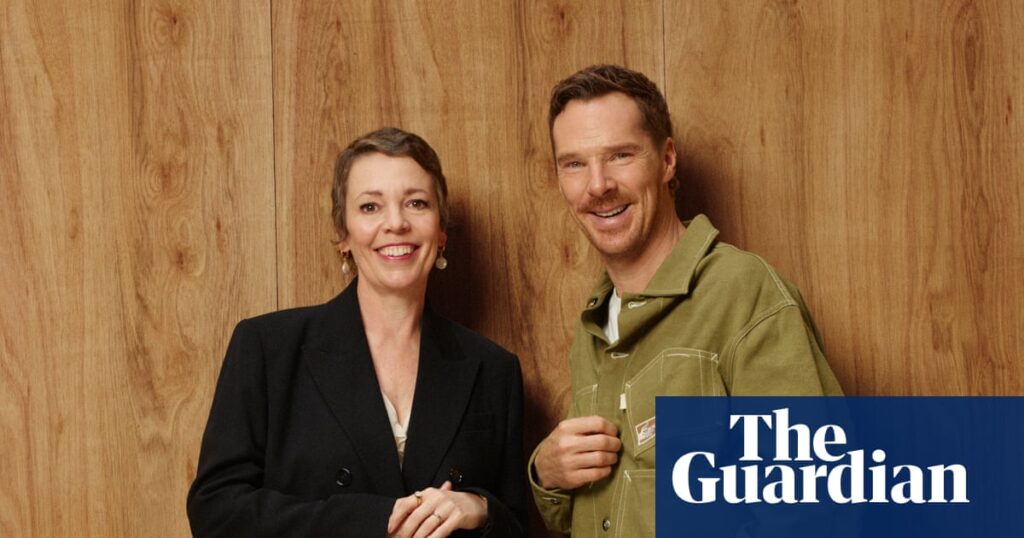
At the heart of the new film The Roses, a counselor asks a couple to list what they love about each other, only to be met with silence. The actors portraying them, however, have no such hesitation. Olivia Colman and Benedict Cumberbatch, reunited for the first time in ages, share a warm camaraderie as they discuss their on-screen and off-screen relationships.
“I love your hair,” Colman exclaims to Cumberbatch, admiring his short sides. The two actors, who have been friends for years, quickly fall into a rhythm of banter, comparing recent events in their lives like half-terms and gardening. Their chemistry is palpable, a testament to their long-standing friendship.
The Dynamics of Love and Hate
When asked about what they dislike about each other, Cumberbatch reflects, “I hate how she thinks five steps ahead of me.” Colman interrupts with a playful moan, knowing that Cumberbatch’s complaints are more endearing than critical. Their exchange is a testament to the complexities of relationships, where love and irritation coexist.
Colman praises Cumberbatch’s talent, noting his extraordinary intuition and raw talent. “That’s one of the things I love about Ben,” she says, highlighting the mutual respect and admiration that underpins their friendship.
A Modern Take on Marriage
The Roses, set for release in 2025, is a reimagining of Warren Adler’s 1981 novel The War of the Roses. The film, directed by Jay Roach, explores the challenges of modern marriage through the lens of Ivy and Theo, played by Colman and Cumberbatch. Unlike the original, the new adaptation focuses less on the darker aspects of the story and more on the nuances of a relationship strained by ambition and societal expectations.
Screenwriter Tony McNamara, known for his work on The Favourite, sees capitalism as a core issue in modern marriages. “Both partners have to work. In the 1960s and 70s, we might have been less emotionally articulate, but it’s tougher today because of the idea you have to get fulfillment from your career and be special,” he explains.
Gender Roles and Expectations
Colman and Cumberbatch discuss the shifting gender roles within the film and in real life. “What I like about this is it’s not about genders, it’s about roles at home. It could be a same-sex couple,” Colman asserts, emphasizing the universality of the film’s themes.
Cumberbatch adds, “There was an idealism in the 60s, the fledgling of equality,” acknowledging the ongoing evolution of gender roles and the challenges they present in relationships.
Exploring Cultural Differences
Roach, who harbored aspirations of becoming a couples therapist, uses The Roses to explore the cultural contrasts between the US and UK. The film juxtaposes Ivy and Theo’s sharp British wit with the forthrightness of their American friends, played by Andy Samberg, Kate McKinnon, Jamie Demetriou, and Zoë Chao.
“When Ivy and Theo are really harsh with each other, they’re sort of speaking in their love language,” Roach notes, highlighting the cultural nuances in communication styles.
“In America, individuality is such a currency. It’s bait: ‘Be you!’ It becomes commodified so quickly.” – Sunita Mani
The Impact of Modern Dating
Actors Sunita Mani and Ncuti Gatwa, who play supporting roles in the film, offer a younger perspective on relationships. Gatwa laments the influence of dating apps and social media on modern romance. “There’s this narrative on socials, a line I see all the time: ‘I’m the prize!’” he says, critiquing the commodification of individuality.
Mani echoes this sentiment, noting how fairytales and romantic films have shaped unrealistic expectations of love. “We’ve all been trained to think that someone’s coming to save us,” she remarks.
Reflections on Love and Marriage
Despite the challenges portrayed in the film, both Colman and Cumberbatch remain optimistic about love. “I love love,” Colman declares, while Cumberbatch acknowledges the romantic idealism that often accompanies it. “It’s great to fall in love, but eventually one of you will be dog-tired and doing the bins,” he muses.
Their conversation is a candid exploration of the realities of marriage, where love is both celebrated and scrutinized. As Colman succinctly puts it, “You take turns and step up to the plate.”
As The Roses prepares to hit theaters, it offers a timely reflection on the complexities of modern relationships, inviting audiences to laugh, cry, and perhaps see a bit of themselves in Ivy and Theo’s journey.







